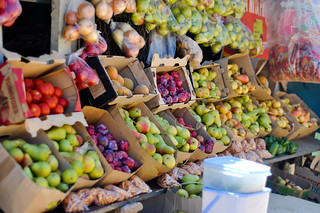Fruit in Uganda: How a Simple Shopping Trip Explains African Politics

Fruit in Uganda: How a Simple Shopping Trip Explains African Politics
Uganda grows apples, bananas, pineapples, passion fruit, mangoes, watermelons, jackfruit, papayas, grapefruits, lemons, and limes—an entire basket of abundance shaped by soil, climate, and policy. In Uganda, even fruit tells a political story.
Shopping for Fruit in Uganda Africa
Apples
Look for firm, crisp apples with strong color. Mealy or overly soft apples are past their prime. Uganda’s apple boom was once considered impossible, but now farmers grow millions— a reminder that seed access and nursery licensing are deeply political decisions.
Grapefruit
Choose fruits that feel heavy and have thin skin. Rough or wrinkled skin signals more rind and less pulp. Grapefruit thrives where irrigation is consistent—yet water access in rural Uganda is shaped by district budgets, private investment, and the broader politics of African farming .
Kiwifruit
Avoid kiwi with shriveling, mold, or excessive softness. Choose plump fruit that yields gently when ripe. Imported seeds, supermarket demand, and global pricing shape what appears in Ugandan markets—agriculture influenced as much by global trade as by local soil.
Lemons
Pick lemons with bright yellow skin, slight gloss, and firmness. Pale lemons are more acidic. Colonial citrus policies once forced African farmers to grow fruit for export instead of local use. Those economic patterns still influence today’s markets and supply chains.
Cantaloupes
A ripe cantaloupe shows a yellowish rind, sweet aroma, and gentle softness at the blossom end. Melon cultivation reflects land rights—especially the ability of women farmers to own land and invest long-term. A sweet melon is also a sign of stable land tenure.
Watermelons
Look for smooth skin, rounded ends, and a yellow underside. Transporting melons across Uganda requires navigating fuel prices, road quality, and market taxation. A sweet watermelon must survive more than farming—it must survive bureaucracy.
The Politics Beneath Uganda’s Soil
Uganda’s loam soil is famously fertile—soft, nutrient-rich, moisture-retentive. But soil alone does not feed a nation. Land rights, market access, and national policy determine who benefits from that fertility. For more on continental geology, see volcanic African soils.

Lake Victoria’s Role in Uganda’s Food Life
Lake Victoria—the world’s largest tropical lake—touches Uganda, Kenya, and Tanzania. It irrigates fields, shapes microclimates, and drives regional trade. Its water is shared, negotiated, and regulated, making it a political force in agriculture. Learn more about regional water systems in the overview of the African Great Lakes .


Why Fruit in Uganda Explains Politics
On the surface, this is a guide to choosing apples, lemons, melons, and kiwi. But beneath every fruit is a story of colonial legacies, land struggles, water rights, trade, farming policy, and geography. In Africa, food is never just food—it is policy, economics, and history wrapped in a peel.























